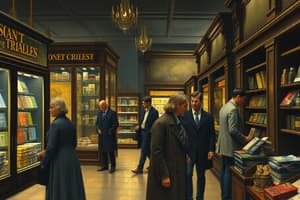Podcast
Questions and Answers
What are the 4 levels of service retailers can offer?
What are the 4 levels of service retailers can offer?
Self-Service, Self-Selection, Limited Service, Full Service
Define 'Shopping Marketing'.
Define 'Shopping Marketing'.
The way manufacturers and retailers use stocking, displays, and promotions to influence consumers actively shopping for a product.
What are 4 of the 6 major types of corporate retail operations?
What are 4 of the 6 major types of corporate retail operations?
Corporate chain store, Voluntary chain, Retailer cooperative, Consumer cooperative
_____ ________ is the look and physical layout of the store.
_____ ________ is the look and physical layout of the store.
Identify 4 of the 6 types of locations which retailers can place their stores.
Identify 4 of the 6 types of locations which retailers can place their stores.
Define 'Private-Label Brand'.
Define 'Private-Label Brand'.
Why might a retailer offer a private-label brand?
Why might a retailer offer a private-label brand?
Identify 6 of the 9 functions of wholesalers.
Identify 6 of the 9 functions of wholesalers.
Define 'Bulk Breaking'.
Define 'Bulk Breaking'.
Identify the 4 steps of Market Logistics Planning.
Identify the 4 steps of Market Logistics Planning.
Study Notes
Levels of Service Retailers Offer
- Self-Service: Customers perform their own selection and payment.
- Self-Selection: Customers choose products with limited assistance from staff.
- Limited Service: Retailers provide some assistance but expect customers to do most shopping independently.
- Full Service: Retailers offer extensive help and advice at every shopping stage.
Shopping Marketing
- A strategy used by manufacturers and retailers to influence in-store consumer behavior.
- Involves use of product stocking, attractive displays, and tailored promotions.
Types of Corporate Retail Operations
- Corporate Chain Store: Multiple locations owned by a single organization.
- Voluntary Chain: Independent retailers banding together for collective purchasing.
- Retailer Cooperative: A group of independent retailers that cooperate in purchasing and marketing.
- Consumer Cooperative: Owned and operated by consumers for mutual benefit.
Store Atmosphere
- Refers to the visual design and physical layout of a retail establishment impacting customer experience.
Retail Locations
- Central Business Districts: Primary area in a city where retail activities are concentrated.
- Regional Shopping Centers: Large malls serving a broad geographic area.
- Community Shopping Centers: Smaller retail environments serving local neighborhoods.
- Shopping Strips: A row of retail stores sharing a common parking area.
- Within a Larger Store: Retail spaces located inside other store formats.
- Stand-Alone Store: Independent shops located separately from others.
Private-Label Brand
- Exclusive brands developed by retailers or wholesalers, available only in their own stores.
Advantages of Private-Label Brands
- Typically 10-40% lower in price compared to national brands.
- Higher profit margins due to reduced marketing and R&D costs.
- Increased consumer adoption during economic downturns.
- Customers tend to remain loyal once they switch to a private label.
Functions of Wholesalers
- Selling and Promoting: Actively marketing products to retailers.
- Buying and Assortment Building: Purchasing large inventories and creating product variety.
- Bulk Breaking: Dividing large quantities into smaller, saleable units.
- Warehousing: Storing goods before distribution.
- Transportation: Moving products from warehouses to retailers.
- Financing: Assisting with credit and payment solutions for retailers.
Bulk Breaking
- A wholesaling process where large quantities are purchased and then divided into smaller units, allowing for lower consumer prices.
Market Logistics Planning Steps
- Identify the company's value proposition: Determine what value will be delivered to customers.
- Select the best channel design: Choose the most effective distribution channels for products.
- Develop operational excellence: Optimize processes to improve efficiency and effectiveness.
- Implement the solution: Execute the chosen logistics strategy.
Studying That Suits You
Use AI to generate personalized quizzes and flashcards to suit your learning preferences.
Description
This quiz focuses on Chapter 13 from Kotler and Keller, covering key concepts in retailing, wholesaling, and logistics. It includes definitions and fundamental principles essential for understanding the dynamics of service levels and shopping marketing. Test your knowledge of these concepts with interactive flashcards.



